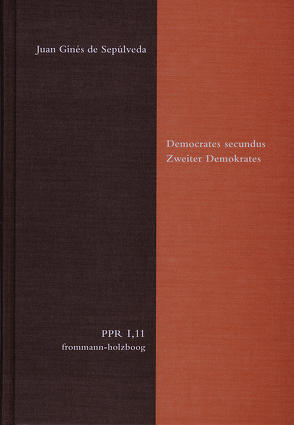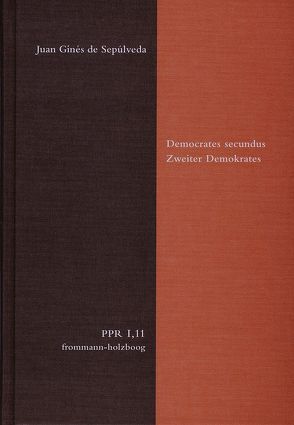
Der bedeutende Humanist Juan Ginés de Sepúlveda war der große Widersacher von Bartolomé de Las Casas in der während des 16. Jhdts. öffentlich ausgetragenen Kontroverse um die Rechtfertigung der spanischen Eroberung der Neuen Welt und die moralische Vertretbarkeit der Unterwerfung und Versklavung ihrer Ureinwohner. Seine Sicht der Dinge legte Sepúlveda in einem ›Democrates secundus‹ betitelten Dialog vor, dessen Hauptargument darin bestand, nachzuweisen, dass es sich bei den Bewohnern der Neuen Welt um Barbaren von der Art handelte, die Aristoteles in seiner ›Politik‹ als »Sklaven von Natur aus« definiert hatte. Ziel des Dialogs, dessen Publikation in Spanien jahrhundertelang verboten blieb, war der Aufweis, dass die den »Barbaren« der Neuen Welt natürlich gegebene Wesensverfassung sklavisch ist und gravierende Verstöße gegen das menschlich Gebotene, etwa in Form von Menschenopfern und Kannibalismus, nach sich ziehen musste. Die spanische Conquista sei daher aus zwei Überlegungen als gerechtfertigt anzusehen: aus Gründen der humanitären Intervention zur Unterbindung weiterer unmenschlicher Greueltaten einerseits und zum Nutzen der Unterworfenen andererseits, die eine ihrer natürlich sklavischen Wesensart entsprechende despotische Herrschaft erhalten würden. Sepúlvedas Dialog unternimmt dabei den Versuch, diese Auffassung durch die Lehren großer Philosophen, Theologen und Juristen in gelehrter Ausführlichkeit zu belegen.
When in 1550 and 1551, Juan Ginés de Sepúlveda and Bartolomé de Las Casas famously quarreled over the justification of the Spanish conquest of the New World before the Royal and Supreme Council of the Indies at Valladolid, their arguments mostly repeated and reflected a longstanding tradition of the academic discussion of the just war theory. The main tenets of this discussion had been received, collected, expanded and transferred to the specific case of the Conquista during the preceding two generations of Spanish philosophers, theologians and experts in both laws. Particularly the erudite scholar Sepúlveda seems to have given hardly more than a brief sketch of the main tenets that were on the table in the 16th century in the debate of Valladolid, referring to the four key arguments he had assembled and learnedly demonstrated in his ambitiously written, but unpublished dialogue ›Democrates secundus or On the just causes for a war‹ (at the indios). In this dialogue, the four arguments are presented and defended by a learned Greek, Democrates, who tries to prove the legitimacy of the Spanish conquest and dominion in the New World against a German called Leopold, who echoes pacifist views reminiscent of Erasmus of Rotterdam. The four arguments of the ›Democrates secundus‹ are: the barbarian status of the indigenous people and their condition of natural slaves, their offenses against Natural Law, the need for humanitarian intervention given the widespread practice of human sacrifice and anthropophagy, and the right of free religious and cultural exchange. As Sepúlveda presents these arguments, he is eager to show that all of them were advanced by philosophers, jurists and theologians of high reputation: Augustine and Thomas Aquinas, Ulpianus and Gerson, and, above all, Aristotle, whose political philosophy is the basis for Sepúlvedas reasoning throughout the dialogue. It was precisely this kind of reasoning that transferred Aristotle’s theory of natural slavery to the people of the New World which was responsible for the harsh criticism that Sepúlveda had to face from Las Casas and most other Spanish theorists of the time. Due to this criticism, Sepúlveda’s dialogue was never given the royal privilege to be published and it was only in the late 19th century that the first of a very small number of extant manuscripts of the ›Democrates secundus‹ was rediscovered.
Aktualisiert: 2020-12-22
> findR *

When in 1550 and 1551, Juan Ginés de Sepúlveda and Bartolomé de Las Casas famously quarreled over the justification of the Spanish conquest of the New World before the Royal and Supreme Council of the Indies at Valladolid, their arguments mostly repeated and reflected a longstanding tradition of the academic discussion of the just war theory. The main tenets of this discussion had been received, collected, expanded and transferred to the specific case of the Conquista during the preceding two generations of Spanish philosophers, theologians and experts in both laws. Particularly the erudite scholar Sepúlveda seems to have given hardly more than a brief sketch of the main tenets that were on the table in the 16th century in the debate of Valladolid, referring to the four key arguments he had assembled and learnedly demonstrated in his ambitiously written, but unpublished dialogue ›Democrates secundus or On the just causes for a war‹ (at the indios). In this dialogue, the four arguments are presented and defended by a learned Greek, Democrates, who tries to prove the legitimacy of the Spanish conquest and dominion in the New World against a German called Leopold, who echoes pacifist views reminiscent of Erasmus of Rotterdam. The four arguments of the ›Democrates secundus‹ are: the barbarian status of the indigenous people and their condition of natural slaves, their offenses against Natural Law, the need for humanitarian intervention given the widespread practice of human sacrifice and anthropophagy, and the right of free religious and cultural exchange. As Sepúlveda presents these arguments, he is eager to show that all of them were advanced by philosophers, jurists and theologians of high reputation: Augustine and Thomas Aquinas, Ulpianus and Gerson, and, above all, Aristotle, whose political philosophy is the basis for Sepúlvedas reasoning throughout the dialogue. It was precisely this kind of reasoning that transferred Aristotle’s theory of natural slavery to the people of the New World which was responsible for the harsh criticism that Sepúlveda had to face from Las Casas and most other Spanish theorists of the time. Due to this criticism, Sepúlveda’s dialogue was never given the royal privilege to be published and it was only in the late 19th century that the first of a very small number of extant manuscripts of the ›Democrates‹ secundus was rediscovered.
Aktualisiert: 2023-03-14
> findR *

In den letzten Jahren hat sich das Spektrum soziologischer Themen und Grundlagenfragen erweitert. Die vormals übliche Gleichsetzung von Menschlichem und Sozialem wird nicht nur infrage gestellt, sondern selbst zum Gegenstand gemacht. Aus der Wissenschafts- und Technikforschung stammt die Forderung, dass die Beobachtung interpersoneller Beziehungen auf Dinge und Technik auszuweiten ist. Daneben hat sich ein Forschungsfeld etabliert, in dessen Rahmen eigens die Bedingungen und Verläufe gesellschaftlicher Grenzziehungsprozesse analysiert werden.
Der Frage nach den Grenzen der Sozialwelt liegt die zentrale These zugrunde, dass es historisch kontingent ist, wie in Gesellschaften der Kreis allgemein anerkannter Sozialwesen begrenzt wird. Die Pointe ist, dass die Frage, wer eine soziale Person ist und was nicht, sich nicht theoretisch, sondern nur empirisch beantworten lässt, indem die praktische Realisierung gesellschaftlicher Wirklichkeitsbildung in den Blick genommen wird.
Die reflexive Wendung auf den soziologischen Gegenstand ist nicht nur eine theoretische, sondern vor allem auch eine methodologische Herausforderung. Auf den Punkt gebracht: Wie lässt sich die anthropologische Differenz der Moderne in den Blick nehmen, ohne diese Differenz bei der Beobachtung bereits vorauszusetzen?
Dieses Buch schlägt eine reflexive Verzahnung von Sozialtheorie und empirischer Analyse vor. Im ersten Teil werden die Anforderungen in Auseinandersetzung mit Konzepten Helmuth Plessners und Gesa Lindemanns erörtert sowie die ‚Theorie historischer Wissensordnungen‘ in Weiterentwicklung der ‚Neuen Wissenssoziologie‘ von Peter L. Berger und Thomas Luckmann vorgestellt. Der zweite Teil bringt den methodologischen und theoretischen Ansatz zur Anwendung. Im Zentrum steht hier die Analyse der spanischen Kolonialismusdebatte zwischen Bartolomé de Las Casas und Juan Ginés de Sepúlveda während der Junta von Valladolid Mitte des 16. Jahrhunderts. Der Vergleich von moderner und frühneuzeitlicher Wissensordnung zeigt die Variabilität der Bedingungen und Formen praktischer Wissensproduktion: Eine allgemein geltende Grenze zwischen dem Sozialen und Nicht-Sozialen, wie dies für die westliche Moderne gilt, ist am Beginn der Frühen Neuzeit weder denkbar noch möglich.
Aktualisiert: 2020-01-14
> findR *
MEHR ANZEIGEN
Bücher zum Thema Juan Ginés de Sepúlveda
Sie suchen ein Buch über Juan Ginés de Sepúlveda? Bei Buch findr finden Sie eine große Auswahl Bücher zum
Thema Juan Ginés de Sepúlveda. Entdecken Sie neue Bücher oder Klassiker für Sie selbst oder zum Verschenken. Buch findr
hat zahlreiche Bücher zum Thema Juan Ginés de Sepúlveda im Sortiment. Nehmen Sie sich Zeit zum Stöbern und finden Sie das
passende Buch für Ihr Lesevergnügen. Stöbern Sie durch unser Angebot und finden Sie aus unserer großen Auswahl das
Buch, das Ihnen zusagt. Bei Buch findr finden Sie Romane, Ratgeber, wissenschaftliche und populärwissenschaftliche
Bücher uvm. Bestellen Sie Ihr Buch zum Thema Juan Ginés de Sepúlveda einfach online und lassen Sie es sich bequem nach
Hause schicken. Wir wünschen Ihnen schöne und entspannte Lesemomente mit Ihrem Buch.
Juan Ginés de Sepúlveda - Große Auswahl Bücher bei Buch findr
Bei uns finden Sie Bücher beliebter Autoren, Neuerscheinungen, Bestseller genauso wie alte Schätze. Bücher zum
Thema Juan Ginés de Sepúlveda, die Ihre Fantasie anregen und Bücher, die Sie weiterbilden und Ihnen wissenschaftliche
Fakten vermitteln. Ganz nach Ihrem Geschmack ist das passende Buch für Sie dabei. Finden Sie eine große Auswahl
Bücher verschiedenster Genres, Verlage, Autoren bei Buchfindr:
Sie haben viele Möglichkeiten bei Buch findr die passenden Bücher für Ihr Lesevergnügen zu entdecken. Nutzen Sie
unsere Suchfunktionen, um zu stöbern und für Sie interessante Bücher in den unterschiedlichen Genres und Kategorien
zu finden. Unter Juan Ginés de Sepúlveda und weitere Themen und Kategorien finden Sie schnell und einfach eine Auflistung
thematisch passender Bücher. Probieren Sie es aus, legen Sie jetzt los! Ihrem Lesevergnügen steht nichts im Wege.
Nutzen Sie die Vorteile Ihre Bücher online zu kaufen und bekommen Sie die bestellten Bücher schnell und bequem
zugestellt. Nehmen Sie sich die Zeit, online die Bücher Ihrer Wahl anzulesen, Buchempfehlungen und Rezensionen zu
studieren, Informationen zu Autoren zu lesen. Viel Spaß beim Lesen wünscht Ihnen das Team von Buchfindr.


